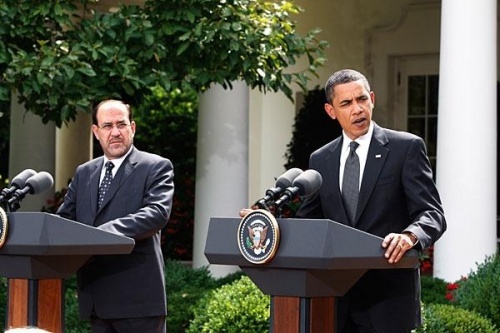
Because Iraqi Parliament would not agree to immunity for US personnel serving in Iraq, the US did not leave behind a contingent of around 5,000 service personnel to assist in training and addressing emerging challenges. This is a significant point, and it could have broader ramifications for Iraq’s relations with the US and its neighbor Iran.
President Obama has presented the complete withdrawal by end of 2011 as both keeping of campaign promise and optimization of US military assets. (See FILM REPORT – “Iraq/Libya-Obama” -
diplomaticallyincorrect.org/films/movie/iraqlibya-obama/28940 ). However, the withdrawal leaves the current Iraqi government vulnerable before its military and law enforcement is fully prepared to address challenges from insurgencies and Al-Qaeda affiliated elements that have sprouted since the beginning of the war over 8 years earlier.
President Obama stated that Iraqi Prime Minister Maliki (PHOTO with President Obama in 2009 at White House) is in full agreement with the withdrawal schedule. However, that is not entirely consistent with previous statements of Maliki and many other officials who still believe a US presence as trainers and symbolically might have been warranted until greater stability was achieved. Whether currently US troops are cause for incitement by insurgents/terrorists, it is evident that Iraq continues to suffer through terror attacks designed to destabilize and/or incite religious/ethnic conflict.
The Iraqi Parliament having experienced the abuses/excesses of those associated with the US or “Coalition” occupation was unwilling to adopt a SOFA agreement, (Status of Forces Agreement), with the US by which US personnel would presumably enjoy immunity before Iraqi courts and law enforcement. Such US individuals presumably could be prosecuted before US military and/or civilian courts. However, the history of some rather notorious incidents, particularly involving private security firms as Blackwater, have left the Iraqis unconvinced and much of the population cynical regarding US government commitments. (READ –“Private Security & Military in Iraq” -
diplomaticallyincorrect.org/films/blog_post/private-security-military-in-iraq-un-expert-urges-controls-by-ambassador-mo/29472 ).
This is a most evident example of how too great dependence on outgunning the enemy and failures to reign in abuses by your own forces can critically undermine your efforts and perhaps unwind all successes achieved at such a high cost to ordinary American service men and women. US strategic interests are very much in the balance, probably at risk. Undoubtedly the current Teheran government will seek to fill the security void at one end while insurgents/terrorists will press from the other. The best hope is that Iraqi’s are committed to their democracy achieved with the overthrow of Saddam Hussein’s regime. However, I’m not necessarily convinced that most Iraqi’s have witnessed the best of US democracy and responsibility toward the rule of law. On the other hand, there are many disintegrationist forces in Iraq, and those willing to pursue conflict and terror to further their own narrow agenda, or in the least undermine confidence in Iraq’s new institutions and democratic, tolerant, free society principles.
By Ambassador Muhamed Sacirbey
Facebook Become a Fan at “Diplomatically Incorrect”
Twitter – Follow at DiplomaticallyX
War Crimes Justice” Channel -
diplomaticallyincorrect.org/c/war-crimes-justice

